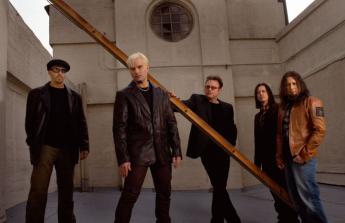Search
Lyn Guy reports on Queensryche - Cambridge Corn Exchange, 21 June 2008

Here’s a cautionary note – if you ever plan on witnessing a live theatrical production of Rock concept albums, check out the recordings first. By the time Queensryche released Operation: Mindcrime in 1988 I was a fan, but not a committed one. So 2006’s Mindcrime II passed me by.
Nevertheless, it’s been some years since the Seattle band last toured the UK - and they had certainly never appeared in Cambridge before. Ergo, this was a much-anticipated event. Queensryche are probably the foremost ‘Operatic’ metal band to have emerged in the mid 1980s and they have survived almost intact. Still fronted by ‘histrionic’ vocalist Geoff Tate, the major change in their ranks was from original guitarist and co-writer Chris de Garmo to Mike Stone in 1998.
The point of a Mindcrime production was to mark the 20th anniversary of the original album’s release. In précis, the two recordings tell the tale of Nikki – a drug addict manipulated by mysterious underworld figure Dr X – and his lover Sister Mary, an ex-prostitute who is equally under control. Nikki is little more than a hired killer for Dr X until he refrains from dispatching Sister Mary. She is ‘persuaded’ to shoot herself, her lover imprisoned for the crime. Released in Part II, Nikki uncovers the truth behind Mary’s death, shoots his way into Dr X’s presence and exacts his revenge.
With me so far? Employing a cast of (I think) four actors playing various roles, using an industrial style set and an ever-changing film projection behind that, Queensryche delivered their story with power and instrumental precision. Notable moments were the telling spread of blood red across the screen behind Mary as she pulled the trigger, rapidly followed by her being consumed in smoke and (celluloid) fire when Nikki found the body. No dramatic licence here – the plot is so clear another gig-goer commented he’d not previously realised she committed suicide!
Though Tate proved his mettle in bringing Nikki’s torment to life, throughout much of the show both Pamela Moore (Sister Mary) and his voices were submerged beneath the intense musical score. Only the odd sentence emerged with true lucidity. And watching the two key protagonists stroll into eternal sunlight together at the end of a work combining such intelligence and imagination was somewhat anti-climactic. The key is whether Queensryche inspired their audience. Certainly a three-song encore was demanded most vociferously. As for your confused scribe? Suffice it to say my interest was well and truly revived by the Mindcrime experience.
Writer: Lyn Guy